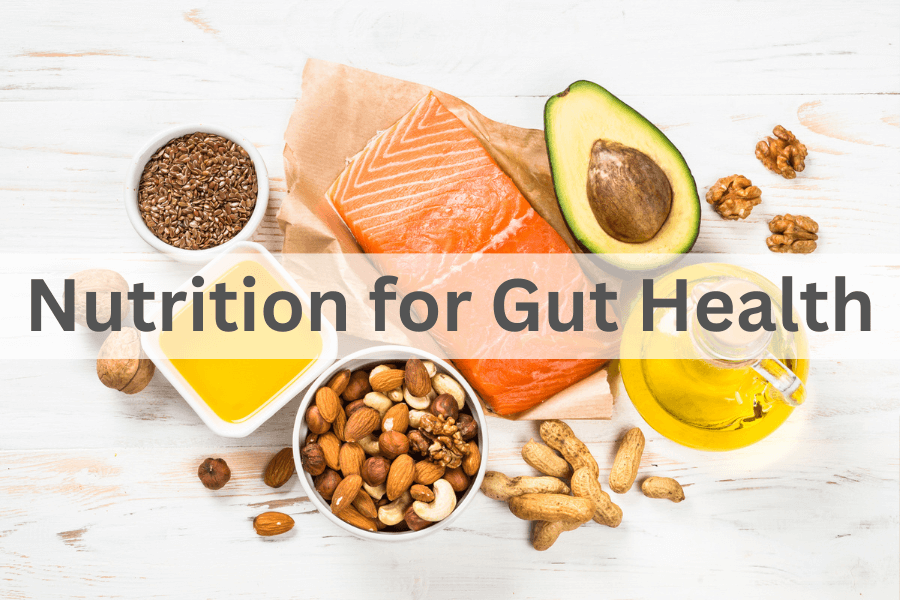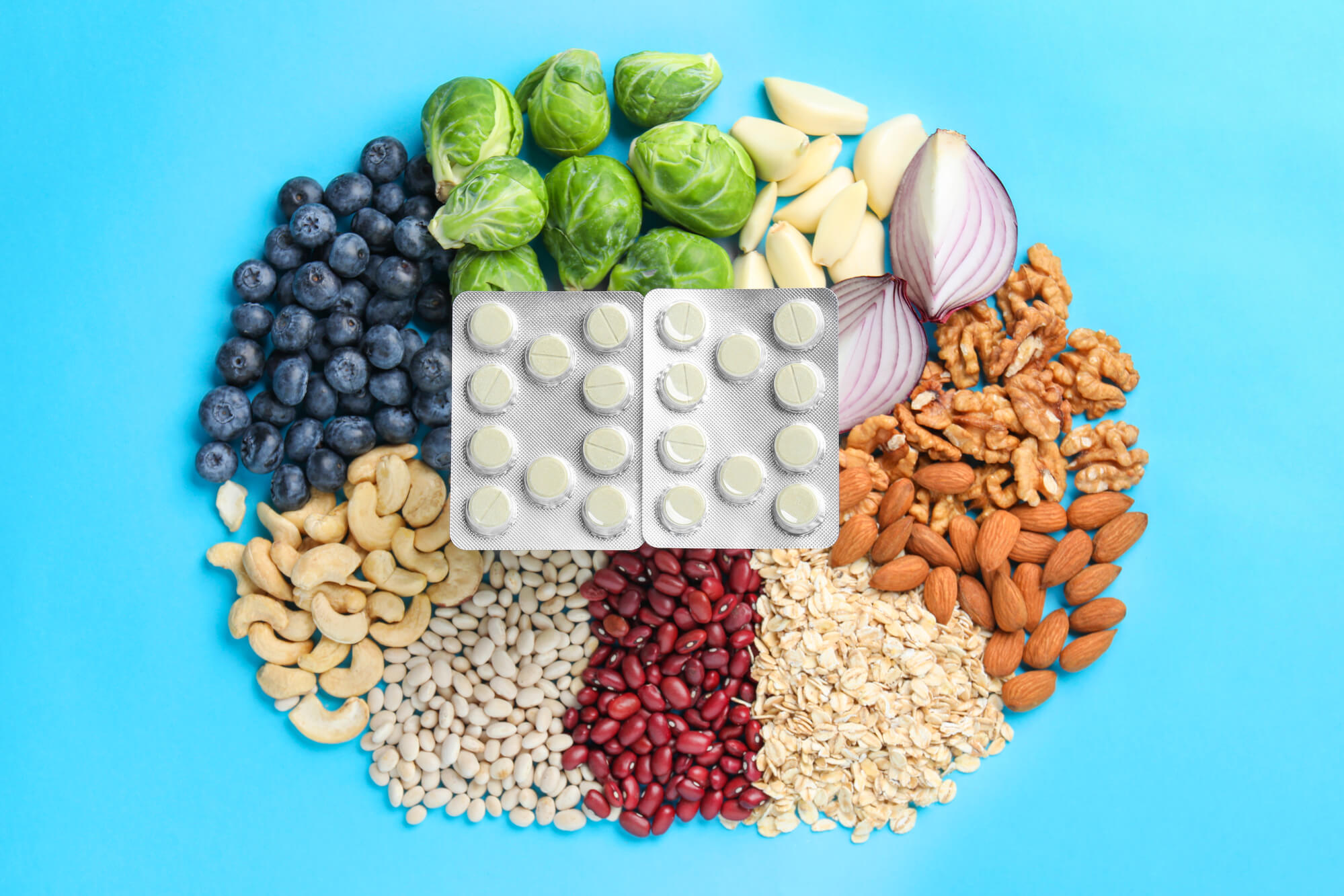Have you ever thought about Nutrition for Gut Health? Do you ever feel sluggish or bloated throughout the day? Well, if so, then I’ve definitely feel ya.
There is a very good chance that it has to do with your diet (as this was the case for me).
In this post, I’m going to talk all about Nutrition for Gut Health.
Here you will understand how food and supplements can actually improve your digestive system. Following these tips, you should start to enjoy more energy and start feeling better every single day.
Let’s dive into how proper nutrition can build healthier guts and read all about the best Nutrition for Gut Health.

Gut health is essential to overall well-being. It’s hard to enjoy your life and get things done when your stomach is constantly aching and you have issues with nausea, constipation or diarrhea.
The good news is that eating the right foods can have a major positive impact on digestion and overall well-being. Good nutrition plays a role in gut health, because food becomes more than just calories being consumed – it becomes fuel for the body.
Here you will learn more about the different types of foods that promote gut health, benefits of eating a balanced diet, the proper supplements to take, and so much more!
After learning all of the tips and tricks for nutrition and your gut, you will soon be able to stock up on the foods and supplements that will get your gut to where it needs to be.
This post is all about Nutrition for Gut Health.
Please note that we are not medical professionals and this post contains general information that should not replace the advice of your doctor or nurse.
Nutrition for Gut Health
Gut health is such an important component of your overall wellness and has been linked to a variety of benefits, including improved immunity, better digestion, reduced inflammation, and even mental clarity.
Overview of Gut Health
Our gut microbiome consists of the trillions of bacteria that live in our digestive system and can influence many aspects of our health.
This microbiome is the foundation of your health. A balanced gut flora helps us maintain optimal health by aiding in nutrient absorption and protecting against harmful microbes that could cause disease or other issues.
Nearly 70-80% of immune cells are in our guts. Therefore, having good nutrition for gut health makes it even more important to keep our guts in balance and protect our immunity.
Types of Foods that Promote Gut Health

The first step in understanding the best nutrition for gut health is to learn about the types of foods that are helpful to your gut.
High-Fiber Foods
Foods that are high in fiber such as fruits, vegetables, whole grains, legumes and nuts are especially beneficial for gut health.
Fiber is so good for your digestion because it helps keep your gut lining in tact by nourishing your healthy gut bacteria. In addition, fiber helps keep you regular. Eating fiber helps bulk up the stool and keeps all of the waste moving.
Pro Tip: In order for fiber to work properly, you need to consume lots of water (or other fluids).
High-Fiber Food Examples:
- Beans
- Broccoli
- Berries
- Avocados
- Apples
- Nuts
Probiotic Foods and Gut Health
Probiotic foods like yogurt or fermented foods like sauerkraut can help maintain an optimal balance of bacteria in the gut. They help balance the good bacteria in your digestive system and restore balance back into the gut.
Probiotic Food Examples:
- Sauerkraut
- Kefir
- Greek Yogurt
- Miso
- Apple Cider Vinegar
Prebiotic Foods and Gut Health
Foods that contain prebiotic fibers serve as nutrition for the beneficial bacteria already present in your digestive tract. Prebiotics are the plant fibers that feed the good bacteria in your digestive tract.
Both prebiotics and probiotics are important for your gut health. However, prebiotics are often more robust than probiotics and generally do not get destroyed during digestion.
Prebiotic Food Examples:
- Chicory Root
- Dandelion Greens
- Garlic
- Onions
- Leeks
Adding these nutrient-dense foods into your diet regularly will ensure you get all the vitamins and minerals you need to keep your gut healthy!
Benefits of Eating a Balanced Diet for Gut Health

Eating a balanced diet is essential for maintaining good gut health, which can have far-reaching benefits for overall wellness.
What is a Balanced Diet?
A balanced diet is a nutrition plan that includes all the essential nutrients, including proteins, carbohydrates, fats, vitamins and minerals. It also provides adequate amounts of fiber to ensure proper digestion and absorption of food.
Why is a Balanced Diet Important?
Eating a balanced diet helps maintain optimal health by providing your body with the nutrition it needs for growth and repair. Additionally, eating a variety of foods ensures that you get an array of important micronutrients. This can help protect your cells from damage caused by free radicals.
By following a balanced nutrition plan – one that includes plenty of fruits and vegetables – you can improve your gut health as well as reduce inflammation in the body.
Incorporating nutrient-dense foods like fiber-rich fruits and vegetables, whole grains, legumes, nuts and probiotics into your daily meals will ensure you get all the vitamins and minerals you need to keep your gut healthy!
The benefits associated with eating a balanced diet for gut health include improved immunity, better digestion, reduced inflammation and even mental clarity.
Tips for Improving Your Digestive System with Nutrition

While there are many way to improve your gut health, improving your digestion through nutrition is one of the best ways to start.
To improve your digestive system with nutrition, there are some simple tips you can follow to ensure you get all the vitamins and minerals needed to keep your gut healthy!
#1: Eat fiber-rich foods such as fruits, vegetables, whole grains, legumes and nuts
- Fiber is an important part of nutrition because it helps regulate digestion and absorption of food and provides your body with the nutrition it needs for growth and repair.
#2: Incorporate probiotics like yogurt or fermented foods into your diet
- Probiotic-rich foods such as yogurt, sauerkraut, kefir, Greek yogurt and miso can help restore balance back into the gut. Eating probiotic-rich foods regularly will ensure that you get all the vitamins and minerals you need for better overall wellness!
#3: Drink plenty of water throughout the day
- Water is essential for good digestion and helps the body break down and absorb nutrients. When we don’t drink enough water, our digestive system can definitely become sluggish.
Following these tips will not only benefit your digestive system but also provide numerous health benefits (such as improved immunity, better digestion, reduced inflammation and even mental clarity).
Supplements to Consider for Optimal Gut Health

Good nutrition is essential for maintaining good gut health, which can have a big impact on our overall wellness. However, nutrition alone may not be enough to ensure optimal gut health.
Supplements are often recommended to help fill any nutritional gaps in our diets that could be contributing to digestive issues or other related health concerns.
There are many different supplements available on the market today that offer nutrition for gut health and can help improve your overall well-being.
Supplements for Gut Health include:
- probiotics
- digestive enzymes
- fiber supplements
- prebiotic fibers
- zinc carnosine
- omega-3 fatty acids
- herbal remedies like turmeric or ginger root extract
Incorporating these nutrient-dense supplements into your diet regularly will ensure that you get all the vitamins and minerals needed to keep your gut healthy!
How to Incorporate Nutritious Foods into Your Daily Routine
Incorporating nutrition for gut health into your daily routine is essential for maintaining good digestive system health and can have far-reaching benefits for overall wellness.
Eating the right types of nutrition helps promote beneficial bacteria in our digestive system. This will ensure that you get all the vitamins and minerals needed to keep your gut healthy.
It is important to incorporate nutrient-dense foods like fiber-rich fruits and vegetables, whole grains, legumes, nuts and probiotics into your meals every day.
Tips for Eating Healthy:
Here are some tips on how to easily incorporate nutritious foods into your daily routine. By doing so, you can reap the many benefits associated with healthy eating such as improved immunity, better digestion, reduced inflammation and even mental clarity!
- Eat a Rainbow – When you eat fruits and vegetables in a variety of colors, the more likely you are to get the nutrients that you need. Be sure to choose a variety of different colored whole foods so that your body gets a range of nutrients.
- Eat More Fish- Not only is fish a good source of protein, but it also gives you your essential, Omega-3s.
- Reduce Saturated Fat and Sugar– Reducing your intake of both saturated fat and sugar will help you maintain a healthier weight, and reduce inflammation and risk of high blood pressure that sugar is believed to cause.
- Eat healthy fats– (such as avocado, nuts, fish and olive oil). Not only do healthy fats have a benefit in reducing your blood sugar, but there is also evidence that they improve the lining of your gut.
Incorporating a variety of nutrient-dense foods such as fiber-rich fruits and vegetables, whole grains, legumes, nuts and probiotics into your diet every day will ensure you get all the vitamins and minerals needed to keep your gut healthy.
Additionally, taking supplements like probiotics, prebiotics, zinc carnosine and omega 3 fatty acids can be really beneficial in filling any nutritional gaps that may exist.
By following these Nutrition for Gut Health tips you should not only benefit from better digestion, but will hopefully experience reduced inflammation, mental clarity, and much more!


